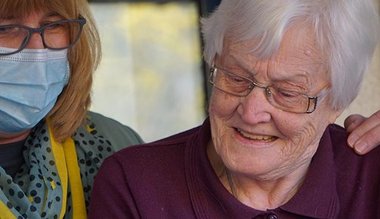Improving palliative care and bereavement support for future generations
A new report in collaboration with King’s College London highlights the need for recognition and sustainable funding of end-of-life care and bereavement support.
 A new report has been published showing how palliative and end of life care in the UK was compromised by shortages of personal protective equipment (PPE), essential medicines, and equipment during the pandemic.
A new report has been published showing how palliative and end of life care in the UK was compromised by shortages of personal protective equipment (PPE), essential medicines, and equipment during the pandemic.
Better End of Life is a collaborative report published by experts from end-of-life charity Marie Curie, King’s College London Cicely Saunders Institute, Hull York Medical School, University of Hull, and the University of Cambridge. It marks the launch of a new research programme that will examine evidence on the current state of dying, death and bereavement across the UK and propose a policy agenda that ensures everyone has the best possible end of life experience.
This report is the first comprehensive review of dying, death and bereavement during COVID-19 and highlights valuable lessons for the long-term future of palliative and end of life care and bereavement support in the UK. It states that more needs to be done to understand the care people did and didn’t receive to ensure that the whole system is ready for the increased number of people dying in the future, which is projected to be 100,000 more people a year across the UK in 20 years.
Prof Katherine Sleeman, King’s College London Cicely Saunders Institute and lead researcher on the Better End of Life Report, said:
The COVID-19 pandemic accelerated the need for palliative and end of life care in the UK. However, the experiences of those affected by dying, death and bereavement – whether as a result of COVID-19 or other conditions - have had little scrutiny to date. It is essential that we learn from the achievements and weaknesses in care that the pandemic has exposed, to improve future provision of palliative, end of life and bereavement care.
In 2020, the number of people who died increased by 91,000 in comparison to the previous five-year average (604,000). There has been a large increase in deaths at home - the overwhelming majority of which were from causes other than COVID-19.
Prof Fliss Murtagh, Professor of Palliative Care and Associate Director of the Wolfson Palliative Care Centre, University of Hull, and co-researcher, said:
While hospital and care homes deaths have increased during the pandemic waves, home deaths have increased throughout all of the last twelve months’, even between the waves. Home-based services have therefore had to provide more support for people dying at home and their families, over the last year.
Research shows that the pandemic has put significant pressure on community-based palliative care in homes and care homes. Dr Stephen Barclay, a GP and Consultant in Palliative Care from the Department of Public Health and Primary Care at the University of Cambridge, and co-researcher, said:
General Practitioners, Community Nurses and Care Home staff have all been at the front line of end of life care during the pandemic. There is a pressing need for their central role in caring for people at the end of their lives to be recognised, supported and adequately resourced.
The research carried out by the Expert Group was shaped and informed by insight from a Patient and Public Involvement (PPI) Reference Group and members of the Cicely Saunders Institute PPI web-based forum.
The Better End of Life 2021 report contains unpublished data from CovPall, a multinational observational study of the role and response of palliative care during the COVID-19 pandemic funded by UK Research and Innovation (UKRI) and the National Institute for Health Research (NIHR) with additional support from the NIHR Applied Research Collaboration, South London, which shows that palliative care teams in all settings were stretched to and beyond capacity, but proved a vital component to the emergency pandemic response.
Prof Katherine Sleeman said:
The data show that hospice and palliative care teams had problems accessing supplies, partly because they felt they were not recognised as part of NHS supply chains.
The report highlights societal preferences and expectations for death and dying may have changed, and if so, that new models of delivering palliative and end of life care in the community would be needed to reduce pressures on the NHS and ensure dying people are supported to die well at home. It is stated that greater support is also urgently needed for those affected by bereavement and complicated grief during the pandemic.
In light of this report, Marie Curie is calling for a long-term settlement to ensure end of life care is sustainably funded, with a particular emphasis on ensuring people dying at home, and their carers, always receive the support they need.
Marie Curie Chief Executive Matthew Reed, said:
Palliative and end of life care must be an essential part of the health and social care system and not a forgotten after-thought. Hospitals and care homes have rightly had a focus in the pandemic but the Better End of Life 2021 Research Report shows us that many in our society fall through the cracks when they need support at the end of life.
You can read the full Better End of Life 2021 report here:
- Better End of Life 2021: Dying, death and bereavement during Covid-19 Research Report.
- Better End of Life 2021: Dying, death and bereavement during Covid-19’ Briefing.
King’s Health Partners Palliative Care Clinical Academic Group is leading improvements in end of life research, education and clinical care and is supported by the world’s first purpose-built institute of palliative care.